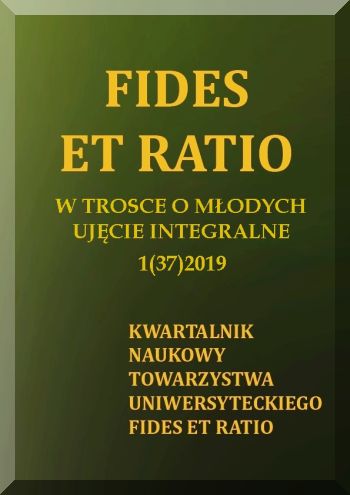Abstract
This thesis presents the results of research on a link between self-esteem and hope for success. The research covered a group of 139 people, including 70 women and 69 men, aged 18-35. The research hypothesis assumes that there is a correlation between said variables in the surveyed population. Besides the verification of the research hypothesis the author tries to inquire into the possible existence of gender-wise differences in the levels of self-esteem and hope for success among young adults. Statistical analysis of the results obtained leads to the following conclusions: 1) the higher the level of hope for success, the: higher the self-esteem; the bigger the ability to defend one’s rights; and the stronger the belief in being loved; 2) the bigger the ability to find solutions, the easier it is to express one’s opinions, especially deny one’s consent to being used or hurt by others; 3) the higher the level of strong will, the: greater the respect for oneself and one’s needs; the bigger the ability to defend one’s rights; and the stronger the belief in being loved by the loved ones; 4) young men do not differ from young women in terms of the level of hope for success and self-esteem.
References
Bakiera L., Stelter Ż. (2011), Leksykon psychologii rozwoju człowieka, t. 2, Warszawa: Wydawnictwo Naukowe Difin.
Białecka-Pikul M. (2011), Wczesne dzieciństwo, (w:) Psychologia rozwoju człowieka, J. Trempała (red.), s. 172–201, Warszawa: Wydawnictwo Naukowe PWN.
Brudek P., Steuden S. (2016), Style radzenia sobie ze stresem, samoocena i nadzieja na sukces u osób w okresie późnej dorosłości o odmiennej specyfice bilansu życiowego, Psychoterapia, nr 1(176), s. 87–102.
Brzezińska A.I., Appelt K., Ziółkowska B. (2016), Psychologia rozwoju człowieka, Sopot: Gdańskie Wydawnictwo Psychologiczne.
Butcher J.N., Hooley J.M., Mineka S. (2018), Psychologia zaburzeń, Sopot: Gdańskie Wydawnictwo Psychologiczne.
Gołuch D. (2011), Poziom lęku i nadziei na sukces a style radzenia sobie ze stresem u
maturzystów, Studia Psychologica, nr 11(1), s. 33–50.
Kielar-Turska M. (2011), Średnie dzieciństwo – wiek przedszkolny, (w:) Psychologia rozwoju człowieka, J. Trempała (red.), s. 202–233, Warszawa: Wydawnictwo Naukowe PWN.
Kofta M., Doliński D. (2006), Poznawcze podejście do osobowości, (w:) Psychologia. Podręcznik naukowy, J. Strelau (red.), t. 2, s. 561–600, Gdańsk: Gdańskie Wydawnictwo Psychologiczne.
Kołodziejczyk A. (2011), Późne dzieciństwo – młodszy wiek szkolny, (w:) Psychologia rozwoju człowieka, J. Trempała (red.), s. 234–286, Warszawa: Wydawnictwo Naukowe PWN.
Kozielecki J. (2006), Psychologia nadziei, Warszawa: Wydawnictwo Akademickie Żak.
Kwiatek P. (2012), Znaczenie i rozwój psychologii nadziei w ujęciu Charlesa Richarda Snydera, Seminare, t. 31, s. 157–170.
Liberska H., Matuszewska M. (2014), Modele wychowania rodziny. Style wychowania, (w:) Psychologia rodziny, I. Janicka, H. Liberska (red.), Warszawa: Wydawnictwo Naukowe PWN.
Łaguna M., Lachowicz-Tabaczek K., Dzwonkowska I. (2007), Skala Samooceny SES Morrisa Rosenberga – polska adaptacja metody, Psychologia Społeczna, t. 2, nr 4, s. 164–176.
Łaguna M., Trzebiński J., Zięba M. (2005), Kwestionariusz Nadziei na Sukces – podręcznik, Warszawa: Pracownia Testów Psychologicznych PTP.
Matczak A., Salata E. (2010), Inteligencja emocjonalna a nadzieja, Kwartalnik Naukowy Fides et Ratio, nr 2(2), s. 19–23.
Oleś P.K. (2011), Psychologia człowieka dorosłego, Warszawa: Wydawnictwo Naukowe PWN.
Oleś P.K., Drat-Ruszczak K. (2015), Osobowość, (w:) Psychologia akademicka, J. Strelau, D. Doliński (red.), t. 1, s. 651–764, Gdańsk: Gdańskie Wydawnictwo Psychologiczne.
Reykowski J. (1970), Obraz własnej osoby jako mechanizm regulujący postępowanie, Kwartalnik Pedagogiczny, t. 3, s. 45–48.
Ryś M. (2010), Człowiek niosący nadzieję, Kwartalnik Naukowy Fides et Ratio, nr 2(2), s. 55–71.
Ryś M. (2011), Kształtowanie się poczucia własnej wartości i relacji z innymi w różnych systemach rodzinnych, Kwartalnik Naukowy Fides et Ratio, nr 2, s. 64–83.
Tomczak K. (2009), Style radzenia sobie w sytuacji stresowej, przekonanie o własnej skuteczności, nadzieja na sukces u studentów rozpoczynających i kończących studia, Psychoterapia, nr 2 (149), s. 67–79.
Wojciszke B., Doliński D. (2018), Psychologia społeczna, (w:) Psychologia akademicka, J. Strelau, D. Doliński (red.), t. 2, s. 293–447, Gdańsk: Gdańskie Wydawnictwo Psychologiczne.
